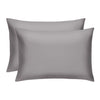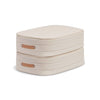The Daily Miracle
How Long Does Melatonin Last? What To Expect
Published
February 20, 2024
Author
Bridget Reed

Ever find yourself staring at the ceiling at 2 a.m., wondering why you can't just drift off no matter how many different sleeping positions you try? Maybe it's the aftermath of a stressful day, or perhaps your mind is racing with tomorrow's tasks.
Often, you might experience the grogginess of jet lag after a long-haul flight, throwing your sleep pattern into disarray. In these moments, many turn to melatonin supplements, a renowned sleep aid.
Naturally secreted by your body, this hormone can provide hope for those craving a good night's sleep. If you're seeking ways to conquer those restless nights and wake up feeling rejuvenated, you're in the right place.
Get ready to embark on a journey toward achieving better sleep, armed with knowledge and practical tips.
What Is Melatonin?
Melatonin, a hormone synthesized in the pineal gland, plays a pivotal role in managing our circadian rhythm, essentially acting as the body's timekeeper. It's not just about signaling sleep and wake times; melatonin harmonizes various biological processes with the natural light-dark cycle of our environment.
However, the modern lifestyle, marked by irregular sleeping patterns and excessive exposure to bright light at night, can disrupt natural melatonin production, leading to sleep problems. This is where dietary supplements containing melatonin step in, providing a boost to the body's natural rhythm.
Melatonin isn’t a sleeping pill. It’s a natural component of your body's physiological process. Its production is influenced by darkness, signaling to your body that it's time to rest, thereby lowering body temperature and preparing for sleep. This mechanism is crucial for maintaining a healthy sleep-wake cycle, especially in a world dominated by screens emitting blue light, which can hinder melatonin levels.
The hormone's role extends beyond just inducing drowsiness; it's integral in regulating sleep patterns, managing mood, and even supporting immune function. By supplementing with melatonin, you're essentially tapping into a natural sleep aid that aligns with your body's internal clock, offering a potential solution to various sleep issues without the risk of dependency associated with some over-the-counter sleep aids.
How Can Melatonin Help Your Sleep?
Taking melatonin can be a transformative approach for those grappling with sleep issues. It's especially beneficial for recalibrating your internal clock, particularly when grappling with the challenges of jet lag or shift work. These situations often result in a misalignment of your circadian rhythm, leading to excessive daytime sleepiness and a disrupted sleep pattern. Melatonin supplements serve as a gentle nudge, helping realign your body's natural sleep-wake cycle.
But melatonin's benefits extend beyond just combating jet lag or aiding shift workers. It's a versatile ally for various rhythm disorders, such as delayed sleep phase syndrome, where individuals struggle to fall asleep until late at night. By taking a low dose of melatonin in the evening, these individuals can gradually adjust their sleep cycle to a more conventional pattern.
Melatonin can also be a boon for those with certain neurological conditions, like autism, where sleep disturbances are common. It's important to note, however, that while melatonin can promote drowsiness and prepare the body for sleep, its effectiveness can be influenced by factors such as the amount of melatonin taken, the timing of the dose, and individual sensitivity.
As always, seeking medical advice from a healthcare provider is crucial before starting any supplement regimen, especially to understand the potential side effects of melatonin and its interaction with other medications. This careful approach ensures that melatonin supplements are used effectively and safely, contributing to better sleep and overall well-being.
Is Melatonin Addictive?
When considering melatonin as a sleep aid, a prevalent concern is its potential for addiction. Thankfully, melatonin, particularly when used for short-term relief of sleep problems, is generally not addictive. Unlike some prescription sleeping pills, melatonin doesn't cause dependency or create a habit-forming pattern. However, it's wise to consult a healthcare provider for personalized medical advice, especially if you're considering higher doses or long-term use.
In addition, understanding the correct use of melatonin is crucial. The Food and Drug Administration (FDA) classifies it as a dietary supplement, which means it's not subject to the same rigorous testing as medications. Therefore, when using melatonin, especially for children or adolescents, it's vital to start with a low dose and monitor any potential side effects.
While melatonin can be a safe and effective natural sleep aid for many, understanding its appropriate use and potential interactions is key to avoiding dependency and promoting better sleep.
How Long Does Melatonin Last?
When you take melatonin, its duration in your system can vary. Typically, the effects last between four to eight hours, influenced by factors like the individual dose of melatonin and one's unique body chemistry. For instance, a higher dose might result in longer-lasting effects but could also increase the risk of next-day drowsiness. Understanding the right amount of melatonin is a delicate balance — too little may be ineffective, while too much can disrupt your next day with lingering sleepiness.
The timing of melatonin intake is another critical factor. To avoid daytime sleepiness, it's recommended to take melatonin about thirty to sixty minutes before bedtime. This allows the body to absorb the hormone and start winding down in alignment with your natural sleep-wake cycle. For those battling jet lag or adjusting to new time zones, the timing might vary to help reset the internal clock more effectively.
Moreover, melatonin's impact isn't just on sleep initiation, but it also influences sleep quality. Some people find that a low dose of melatonin not only helps them fall asleep faster but also improves the overall quality of their sleep, leading to a more restful night. As always, consulting with a healthcare provider can help tailor the use of melatonin to your specific sleep needs, ensuring that you wake up refreshed and ready for the day.
What Else Can You Do To Promote Good Sleep?
Melatonin is a valuable tool for improving sleep, but it's not the only solution. Your sleep environment plays an equally crucial role. Consider the role of your bedding in your sleep quality — are your sheets and pillowcases conducive to good sleep?
Our Miracle Made® bedding, made with antimicrobial silver to minimize bacterial growth and regulate your body temperature throughout the night, prevents overheating and ensures comfortable sleep.
In addition to upgrading your bedding, examine your bedtime routine. Reducing exposure to blue light from screens before bed can significantly improve your sleep pattern.
Blue light has been shown to suppress natural melatonin production, making it harder to fall asleep. A consistent sleep schedule also helps regulate your circadian rhythm, reinforcing your body's natural sleep-wake cycle.
Practicing good sleep hygiene is essential. This includes maintaining a quiet, dark, and comfortable sleeping environment. Avoiding caffeine and heavy meals before bedtime, engaging in relaxing activities, and ensuring your bedroom is reserved for sleep can all contribute to better sleep.
Remember, creating a routine that signals to your body that it's time to wind down is key to improving your overall sleep quality.
The Bottom Line
While melatonin is an excellent aid for occasional sleep disturbances, it's just one part of the equation for achieving a good night's sleep. Combining the strategic use of melatonin with a conducive sleep environment and healthy sleep habits lays the foundation for restorative sleep.
Think about the factors that contribute to your sleep quality — like the comfort of your bedding, the temperature of your room, and the habits that precede your bedtime. As you consider taking melatonin for your sleep issues, don't overlook the importance of a holistic approach to sleep health.
Here's to better nights and brighter mornings!
Sources:
Melatonin: What You Need To Know | National Center for Complementary and Integrative Health




























